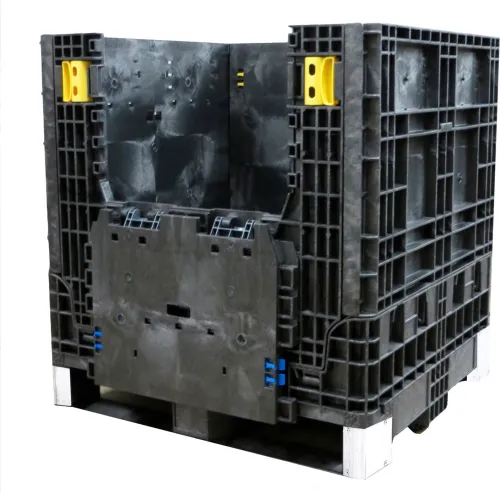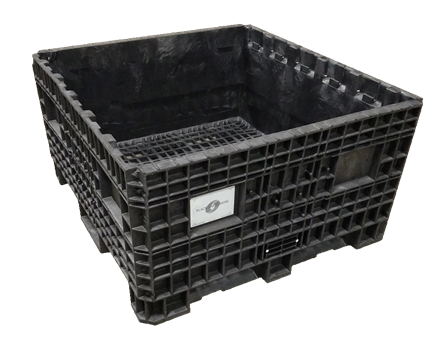Why Mass Containers Are Essential for Lasting and Affordable Transport
Mass containers play an essential duty in modern-day logistics. They assist in the reliable motion of huge quantities of goods, thus enhancing transport processes. This method not just lowers expenses however additionally decreases ecological impact through lower emissions and waste generation. As industries seek more lasting techniques, the adoption of mass containers is coming to be significantly considerable. What implications does this change hold for future logistics and supply chain monitoring?

The Benefits of Utilizing Mass Containers in Logistics
Bulk containers reinvent logistics by enhancing effectiveness and sustainability. These containers permit the transport of huge amounts of goods in a single trip, noticeably reducing the number of trips required. This not only improves operations however likewise reduces labor expenses related to handling, packing, and discharging. Additionally, bulk containers are created to enhance area utilization within transport cars, making sure that even more items can be delivered all at once.
The standardization of mass containers additionally simplifies the logistics procedure. With consistent measurements, they can be quickly piled and stored, causing boosted storage facility management. Mass containers usually feature sturdy products that shield materials from damage during transit, thereby lowering item loss and enhancing overall integrity. Consequently, services can experience improved supply chain efficiency, eventually resulting in raised earnings and consumer contentment. This mix of aspects makes bulk containers a crucial property in contemporary logistics.
Environmental Influence: Lowering Waste and Carbon Impact
As industries progressively focus on sustainability, the fostering of bulk containers has actually arised as a vital technique for reducing waste and decreasing carbon footprints. These containers minimize using packaging products, such as boxes and plastic, thus especially reducing overall waste generation. By settling shipments, bulk containers boost transportation performance, permitting more items to be delivered per trip. This reduction in trips directly correlates with reduced greenhouse gas emissions, contributing to a smaller sized carbon footprint.
In addition, bulk containers can usually be reused or recycled, even more minimizing environmental impact. The sturdiness of these containers warranties they can endure numerous transportation cycles, reducing the need for single-use options. used collapsible containers. By simplifying logistics and advertising efficient source usage, mass containers not only sustain sustainable techniques but additionally urge industries to straighten with worldwide environmental objectives. Ultimately, their application reflects a commitment to eco-friendly stewardship and liable resource administration
Expense Financial Savings: Just How Mass Containers Lower Transport Costs
While lots of companies look for methods to improve their lower line, making use of bulk containers presents a substantial opportunity for lowering transport expenditures. Mass containers take full advantage of the quantity of items transferred, permitting organizations to deliver larger quantities simultaneously. This performance decreases the variety of journeys required, directly reducing gas expenses and lessening labor expenses connected with loading and dumping.
In addition, bulk containers typically feature streamlined layouts that enhance area usage within transportation vehicles. This suggests less empty rooms, causing much more reliable use of available ability. Furthermore, the sturdiness of bulk containers can decrease the danger of product damages during transit, guaranteeing and lowering losses that more items arrive undamaged.
Enhancing Supply Chain Effectiveness With Mass Storage Solutions
Mass storage space services play an important function in enhancing supply chain effectiveness by maximizing inventory administration. By combining goods into less, bigger containers, companies can substantially decrease managing prices connected with constant transfers and processing. This streamlined approach permits far better tracking and administration of stock, ultimately leading to enhanced functional efficiency.
Structured Supply Management
Effective inventory administration is important for optimizing supply chain operations, particularly when organizations take on bulk storage space remedies. These solutions enable companies to preserve higher stock levels while lessening the frequency of replenishment. By combining materials into bulk containers, companies can improve their inventory processes, decreasing the intricacy related to tracking several smaller plans. This approach helps with exact supply matters and boosts projecting accuracy, permitting more informed decision-making. On top of that, mass storage remedies simplify storehouse organization, making it simpler to locate and access items when needed. Therefore, organizations can accomplish a much more efficient supply turn over rate, ultimately boosting total supply chain efficiency and lowering the chance of stockouts or overstock scenarios.

Minimized Handling Prices
The execution of bulk storage options not only enhances supply management yet also significantly reduces managing costs across the supply chain. By settling materials into mass containers, firms decrease the need for regular handling and transfer in between different storage and transport devices. This method lowers labor prices associated with loading, discharging, and relocating smaller sized packages. Furthermore, mass storage space reduces the frequency of shipments, bring about reduced transportation costs and reduced fuel usage. Therefore, organizations can enhance their logistics operations, permitting a much more reliable appropriation of resources. Ultimately, reduced taking care of costs contribute to improved general supply chain performance, promoting an environment that sustains both sustainability and financial viability.

Flexibility of Mass Containers Throughout Different Industries
Although many markets have distinctive requirements for transportation and storage space, mass containers have become a flexible remedy that fulfills a variety of demands. These containers, ranging from huge containers to specialized tanks, can fit diverse materials, including powders, fluids, and granules. In the agricultural market, mass containers facilitate the transport of grains and fertilizers, while the food and drink market utilizes them for active ingredients and completed items. The chemical market counts on mass containers for securely transporting dangerous products, ensuring compliance with security policies. Furthermore, building and construction firms gain from bulk containers for transferring aggregates and other products. Their flexibility encompasses different modes of transportation, including trucks, trains, and ships, improving logistical effectiveness. This adaptability not only enhances procedures throughout various fields yet likewise promotes sustainability by minimizing packaging waste and optimizing space in transit. Consequently, mass containers play an essential duty in modern-day supply chain administration.
Future Patterns wholesale Container Use and Sustainability
The future of bulk container use is progressively shaped by cutting-edge products development that enhances sustainability. In addition, automation in logistics guarantees to streamline operations, lowering waste and improving efficiency. Embracing circular economic climate techniques will further reinvent how bulk containers are created, made use of, and reused, fostering an extra lasting transport landscape.
Ingenious Products Advancement
As industries progressively prioritize sustainability, cutting-edge materials development in bulk containers becomes a substantial consider enhancing environment-friendly transportation options. Researchers and manufacturers are checking out naturally degradable plastics, recycled composites, and light-weight metals to decrease ecological influence. These products not just reduce waste however additionally improve fuel effectiveness by reducing the total weight of containers. Additionally, developments in wise products, which can adjust to varying conditions, boost the sturdiness and performance of mass containers. The assimilation of these cutting-edge products aligns with circular economic situation concepts, advertising reuse and recycling. As the need for sustainable practices expands, the advancement of here such products will certainly play a vital role in shaping the future of bulk container usage in logistics and transportation.
Automation in Logistics
Significant advancements in automation are poised to change logistics and the utilization of bulk containers, enhancing sustainability in transportation. Automated systems, including drones and self-governing automobiles, are simplifying the activity of mass containers, reducing the reliance on conventional fuel-powered transportation. These innovations maximize routing and loading processes, enhancing and lessening empty miles fuel effectiveness. Furthermore, automated stock administration systems boost monitoring and tracking of bulk containers, ensuring far better resource allotment and reduced waste. The assimilation of the Web of Things (IoT) permits real-time information analysis, making it possible for positive decision-making that lines up with sustainability goals. As automation continues to advance, it is anticipated to drive additionally advancements wholesale container use, inevitably sustaining more sustainable logistics methods and lowering the ecological effect of transportation.
Round Economic Climate Practices
Innovations in automation are setting the stage for a much more integrated technique to circular economic situation methods in the domain of mass container usage. As sectors progressively welcome sustainability, bulk containers are being designed for long life and reusability. This shift not just lessens waste but additionally improves source effectiveness. Firms are taking on strategies such as closed-loop systems, where made use of containers are accumulated, reconditioned, and reestablished right into the supply chain. Additionally, wise modern technologies track container life cycles, helping with much better management and lowering ecological effect. The partnership in between manufacturers, logistics providers, and end-users is essential in developing standards for lasting container usage. used collapsible containers. Future trends indicate a growing focus on materials that are recyclable and eco-friendly, more enhancing the round economic climate's principles wholesale transportation

Often Asked Questions
What Products Are Bulk Containers Normally Made From?
Bulk containers are normally constructed from long lasting materials such as high-density polyethylene, steel, cardboard, and light weight aluminum. These materials provide strength, adaptability, and protection, making them appropriate for transporting different products in various sectors successfully.
How Do I Choose the Right Size Bulk Container?
Selecting the ideal dimension mass container entails evaluating the volume of materials to be carried, thinking about managing tools compatibility, and appraising storage space requirements. Proper size guarantees effectiveness in transportation and lessens waste during shipment.
Are Bulk Containers Reusable or Recyclable?
Bulk containers are commonly multiple-use, developed for several journeys, boosting sustainability. Many can likewise be reused, relying on the products utilized. Selecting recyclable alternatives better supports environmental objectives and lowers waste in transport methods.
What Safety Regulations Apply to Mass Container Transport?
Safety and security laws for mass container transport consist of compliance with the Department of Transportation standards, appropriate labeling of dangerous materials, architectural honesty evaluations, and adherence to weight restrictions to assure risk-free handling and avoid crashes throughout transit.
Just How Can Businesses Change to Utilizing Bulk Containers Successfully?
Organizations can alter to bulk containers by evaluating existing logistics, training staff on handling, investing in ideal equipment, maximizing supply monitoring, and teaming up with providers to assure compatibility and efficiency throughout the supply chain.
As markets increasingly focus on sustainability, the fostering of bulk containers has actually emerged as a vital method for decreasing waste and lowering carbon footprints. By consolidating products right into mass containers, business can improve their stock procedures, lowering the complexity linked with tracking several smaller bundles. As sectors significantly focus on sustainability, innovative materials advancement in bulk containers arises as a considerable factor in improving eco-friendly transportation services. Automated systems, consisting of drones and independent lorries, are streamlining the movement of bulk containers, reducing the reliance on typical fuel-powered transportation. Additionally, automated inventory management systems enhance tracking and tracking of bulk containers, making sure better resource allowance and lowered waste.